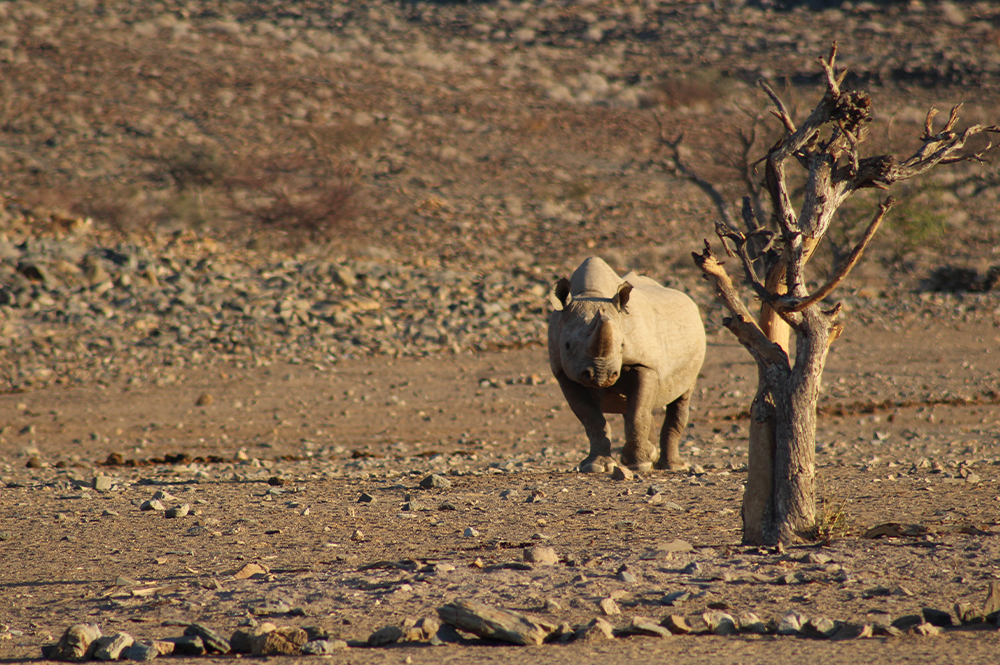It’s day 20. You’ve been on patrol for nearly three weeks, trekking miles through the baking desert, on the lookout for that elusive creature – the black rhino. The sun is rising in the sky, the temperature is sweltering; there’s been no rain for months. You take a swig of water and scan across the vast, arid landscape. It’s so hot the air shimmers, so bright you squint to try and catch any motion. Wait… what’s that?!

Bringing your binoculars to your eyes, you turn the dial to focus and… Yes! A black rhino and her calf!
Trying not to spook them, you quietly retrieve your pencil and rhino ID forms, and note down all the important details about the pair. You record their ages, sex, ear notches, horn size, body condition and any scars. Finishing your records, you watch the pair browsing on Euphorbia before slowly moving away. Time to find the next rhino!
This is a day in the life of a rhino tracker at Save the Rhino Trust (SRT). They monitor the unique, desert-adapted black rhinos living in the Kunene region of north western Namibia. Shuttled by truck to drop-off spots across this huge area, small teams spend 21 days in the field, tracking rhinos on foot by day, and camping out in the wilderness by night.
From November 2018 to October 2019, SRT’s trackers covered a phenomenal 32,494 km on their patrols, recording more than 3,400 individual rhino sightings. These records help to identify different rhinos across the landscape, monitor their condition and assess how the population is doing throughout the region.
The whole team work hard to ensure that the majority of rhinos in Kunene are seen each month, but this is easier said than done. As the last, truly free-ranging population of rhinos on Earth, the great distances travelled by animals in this unfenced environment, especially during the recent drought, have made this task more difficult. Currently, SRT is viewing around 60% of known rhinos each month. SRT aims to grow this level by offering incentives to monitoring teams linked to the number of rhino-sightings they make on patrol.
Key to the Trust’s efforts has been the involvement of local communities in protecting their natural heritage. To stay one-step ahead of poachers, the team regularly visits farmers in the region, who act as the ‘eyes and ears’ on the ground. They help spot and report any suspicious behaviour, which SRT can follow up before poachers have a chance to strike.
The incredible conservation efforts SRT is spearheading are paying off. Excitingly, a number of black rhino calves were born last year, which could represent an increase of more than 10% of this important population! This fantastic achievement goes to show just how effectively SRT, its rhino trackers and partners are working to protect their magnificent rhinos.
The impact of Covid-19
Just like the rest of the world, the team at SRT are having to adapt in the face of the coronavirus pandemic. Similar to many places across Africa, the shutdown of tourism has dramatically cut SRT’s income. As a result, field rations for rhino trackers have been reduced to the bare essentials, and the Trust is finding ways to reduce vehicle running costs.
As rangers’ salaries are paid for by their local conservancies through tourism revenue, plans also have to be made for the possibility that funds won’t be available in the coming months. Although SRT doesn’t pay these salaries, it does provide rhino-sighting bonuses, which will be more important than ever for maintaining the high patrolling level necessary to monitor black rhinos and stop poaching activity.
The generosity of our partners and donors means that we can continue to support the important work the team at Save the Rhino Trust do. However, with the impact of coronavirus looming, we can’t let the pandemic threaten to undercut the successes SRT has secured for the desert-adapted black rhino.
If you can, please donate towards our Rhino Covid-19 Crisis appeal: 50% of all donations in the month of May will go directly towards SRT. A special thanks to rhino’s energy, West Midland Safari Park, Zoo Krefeld and the Desert Heart Party for their committed support for SRT over the past year.









